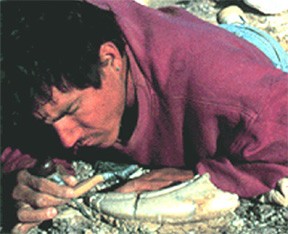
SuperCroc discoverer to speak at Tate lecture
At 40 feet long the ‘SuperCroc’ was as long as a bus. It weighed about 10 tons and lived roughly 110 million years ago, when rivers coursed over what is now sub-Saharan Africa.
At a fossil graveyard called Gadoufaoua, in the hot desert sands of Niger, paleontologist Paul Sereno discovered a nearly complete remains of a Sarcosuchus imperator, or ‘flesh crocodile emperor,’ one of the largest crocodilians to ever walk the Earth. Sereno nicknamed it SuperCroc.
The Omni Hotels Lecture of the Willis M. Tate Distinguished Lecture Series with Paul Sereno will begin at 8 p.m. Tuesday in McFarlin Auditorium.
Students from SMU and area high schools will have a question-and-answer session with Sereno at the Tate Student Forum. It will be held from 4:30-5:15 p.m. Tuesday in the Hughes-Trigg Student Center.
Sereno is searching for fossil evidence that will impact our understanding of large-scale evolution during the dinosaur era. His goal is to explore how continental drift and the isolation of land areas affected the evolution of dinosaurs.
Sereno began studying dinosaur fossils at the American Museum of Natural History in New York. In 1987, he joined the University of Chicago faculty, where he is professor in the department of organismal biology and anatomy.
In the 1990s his field efforts shifted to Africa, to rocks exposed in the Sahara Desert dating to the end of the dinosaur era when the continents were drifting apart.
Expeditions resulted in many discoveries including the first skulls and skeletons of dinosaurs from the Cretaceous period on Africa. Ninety-million to 130-million-year-old rocks revealed fossils documenting the course of dinosaur evolution on Africa, as it drifted into geographic isolation 100 million years ago.
By tracing the many evolutionary changes recorded in their skeletons, Sereno hopes to map the dinosaur family tree.
The branches of the dinosaur evolutionary tree are key to the understanding of how evolution works over millions of years.
Sereno writes for National Geographic and Natural History magazines.
He also co-founded Project Exploration, a not-for-profit educational outreach organization located in Chicago.
Photography using available light will be permitted during the forum, but videotaping will not be allowed. Photography using available light will be permitted only during the first 15 minutes of the evening lecture. Videotaping is not permitted.








